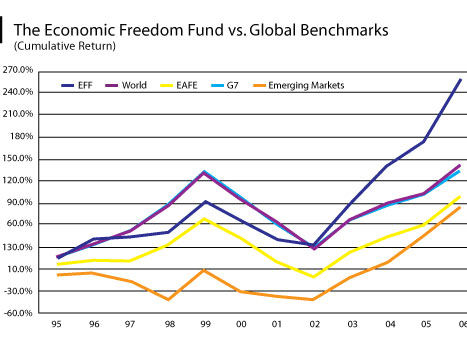Did the world really need yet another mutual-fund gimmick? The Liberty Investment
Group seems to think so: it’s launched something called the Index
of Economic Freedom Portfolio to no little acclaim. Here’s Mark
Skousen:
Spath and Kirkscey back-tested the performance of their index and came to
a startling conclusion: Over the past 11 years, the Economic Freedom Portfolio
has far outperformed world stocks in general. While the MSCI World Stock Index
rose 140% during this time, and the Emerging Markets Index climbed 85%, the
IEFP rose an astonishing 254%. See the graph below.

I have no idea where this chart came from, but it makes no sense to me. There
are two big oddities:
- The lines all start at different points. Shouldn’t they all start at the
same point? (The chart is meant to show returns over 11 years, not over 12
years.)
- The horizontal lines look evenly spaced, but the markers on the y-axis are
all over the shop, with the 0% line marked as 10%, and the 30% line marked
as 130%.
I tried to look at the fund’s prospectus
for insight as to how this chart was calculated, and came up with nothing. Skousen
says that
The Index of Economic Freedom Portfolio (IEFP) is updated each year, according
to the Heritage/WSJ annual index.
And Stephen
Kirchner goes even futher:
First Trust Portfolios LP has launched a fund that tracks the Heritage Foundation/WSJ
Index of Economic Freedom.
Not true. The fund for sale now is the "Index of Economic Freedom Portfolio,
2007 Series" – which means that you buy and hold a bunch
of securities from 17 countries which came somewhere near the top of the index
in 2007. The Portfolio never gets updated: if a country falls out of the index,
its stocks stay in the fund, and if a country makes it into the index, its stocks
will never make it into the fund. If you wanted to track the index, you would
need to sell the 2007 series when the 2008 series was launched, and so on –
paying large up-front fees each time.
And I have no idea what this means, from Skousen:
In 1995, the IEFP consisted of only 6 countries. Now there are 17 countries
in the portfolio. Clearly, economic freedom has been expanding around the
globe.
There might be 17 countries in the portfolio, but there are no fewer than 30
countries ranked
"free or mostly free" by the Heritage Foundation index. And it’s not
the top 17 countries which make the cut, either. Estonia, for instance, comes
in 12th on the index, but isn’t in the fund.
So when the fund managers created their pretty chart, did they take returns
from the IEFP, which started off with 6 countries and now has 17? Because if
they did then they’re charting returns from a dynamic portfolio of stocks, which
changes according to the freedom index – and it’s a bit misleading to
then use the returns of that dynamic portfolio to sell a fund which is entirely
static and never changes.
On the other hand, did they just take the 17 securities in the 2007 series,
and see how they’ve performed over the past 11 years? That wouldn’t be much
of an indication of anything, and it’s probably not surprising that the fund
did well over the past 11 years, since the Finland chunk is invested 100% in
Nokia, while the New Zealand chunk is invested 100% in New Zealand Telecom.
Amazingly, both stocks have done very well over the past 11 years: what a coincidence!
Hilariously, they’ve even decided that in order to represent Luxembourg in
their fund, they’re going to invest 100% in Tenaris, which is really more of
an Argentine company than a Luxembourgish one. In any case, Tenaris is a very
multinational company, dependent wholly on the oil industry, which has done
very well in recent years (of course), but which has almost no connection to
economic conditions in Luxembourg.
The Index of Economic Freedom Portfolio is a joke, and I sincerely hope that
people don’t go piling into it based on misleading information from places like
"Investment U". If you really want to bet on the Heritage Foundation
index, take the top 7 countries, ranked "free", and buy the five countries
where there are ETFs based on their stock markets. I’ll even give you the ticker
symbols: EWH (Hong Kong), EWS (Singapore), EWA (Australia), SPY (USA), and EWU
(UK). New Zealand and Ireland are too small to worry about. There – I’ve
just saved you a 3.95% sales charge.
